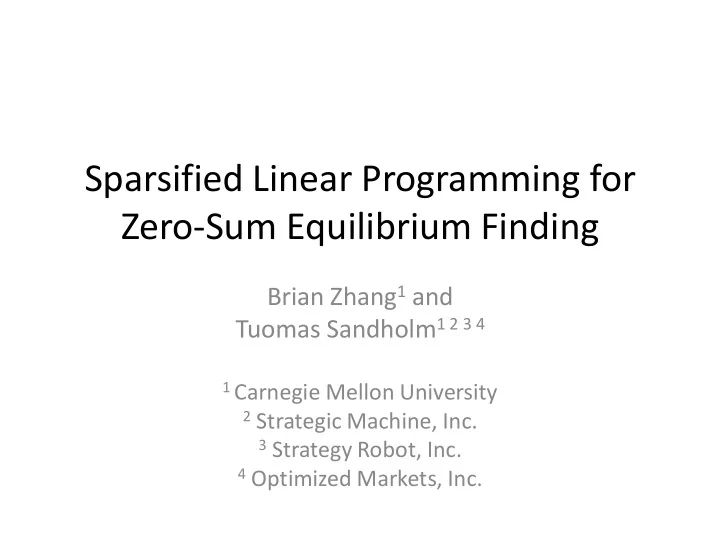

Sparsified Linear Programming for Zero-Sum Equilibrium Finding Brian Zhang 1 and Tuomas Sandholm 1 2 3 4 1 Carnegie Mellon University 2 Strategic Machine, Inc. 3 Strategy Robot, Inc. 4 Optimized Markets, Inc.
Imperfect-information games
Extensive form Information sets Metrics of game size: C • Sequences : 4 + 2 = 6 P1 P1 • Terminal nodes : 6 -0.5 +0.5 P2 P2 +1 +1 -1 -1 “Coin Toss” [Brown & Sandholm ‘17] In general:
Solving (zero-sum) imperfect- information games Convergence rate Iteration time Space* Speed in practice** O(1/ ε 2 ) Modern variants of O(# terminal nodes) O(# sequences) Really fast Counterfactual Regret in worst case; Minimization (CFR) O(# sequences) Zinkevich et al. ‘07; w/ game-specific ideas Brown & Sandholm ‘19 First-order methods O(1/ε) or even O(# terminal nodes) O(# sequences) Almost as fast as Hoda et al. ‘10; O(log(1/ε)) in worst case; modern CFR variants Kroer et al. ’18 [Gilpin et al. ‘12] O(# sequences) w/ game-specific ideas Linear programming O(polylog(1/ ε)) poly(# terminal nodes) poly(# terminal nodes) Fast Koller et al. ‘94 O(log 2 (1/ ε)) Our contribution O(# terminal nodes) O(# terminal nodes) Really fast Improvements to the in worst case; in worst case; LP method Õ(# sequences) Õ(# sequences) in many practical cases in many practical cases *assuming payoff matrix given implicitly **assuming scalability for memory
Extensive-form games as LPs [Koller et al. ’94] • Sequence-form bilinear saddle-point problem • Dual of inner minimization ⇒ LP – nnz ( A ) = # terminal nodes; A = payoff matrix – nnz ( B ) = # P1 sequences – nnz ( C ) = # P2 sequences Not great…
Fast linear programming: [Yen et al., 2015] • Iteration time: O(nnz(constraint matrix)) • Convergence rate: O(log 2 (1/ ε))
Fast linear programming: Adapting to Games • Iteration time: O(nnz(constraint matrix)) • Iteration time: O(# terminal nodes) • Convergence rate: O(log 2 (1/ ε)) • Problem : Returns an infeasible solution • Solution : Normalize strategy after returning • Theorem : This doesn’t hurt convergence substantially
Factoring the payoff matrix Suppose the payoff matrix A were factorable… Then: Goal : Given A implicitly , factor it.
What about low-rank factorization? e.g., singular vector decomposition (SVD) A = = + 0 Rank 1 Two subproblems
Factorization algorithm Idea: Think about singular vector decomposition, and adapt it When ‖ ⋅ ‖ is the 2-norm, this is power iteration How to solve it?
Exact Solutions to --------------------------- • 2-norm: v = Au (power iteration) • 1- norm: Meng & Xu ’12 • 0-norm: Is the 1-norm better because it is convex? Not really… the overall factorization problem is NP - hard no matter what [Gillis and Vasasvis ‘18] Key: 0-norm computation can be done implicitly ! (i.e., without storing whole payoff matrix!)
So, what have we managed? Matrix factorization ⇒ much sparser LP • Best case: # nonzero elements = O(# sequences) • Upper triangular matrices (e.g. Poker): Õ(# sequences) Does it work in practice? Yes! • Experiment 1: Wide variety of games – Some games factorable, some not – LP solver faster than CFR in all cases – Commercial solver (Gurobi) faster than Yen et al., despite theoretical guarantees
So, what have we managed? Matrix factorization ⇒ much sparser LP • Best case: # nonzero elements = O(# sequences) • Upper triangular matrices (e.g. Poker): Õ(# sequences) Does it work in practice? Yes! • Experiment 2: No-limit Texas Hold’em river endgames – size of payoff matrix reduced >50x – memory usage of LP solver reduced by ~ 20x, time usage by ~ 5x – now feasible as an alternative to poker-specific CFR
Experiment 2
So, what have we managed? • LP algorithm for game solving with good theoretical guarantees and strong practical performance • Moral/Takeaway: LP can be practical for solving even very large games!
Thank you!
Recommend
More recommend